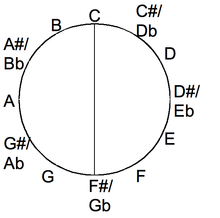Augmented-fourths tuning
| Augmented fourths | |
|---|---|

For every augmented-fourths tuning, the interval between successive open-strings is six semitones, half the circumference of the chromatic circle.
|
|
| Basic information | |
| Aliases | All-tritone tuning, Diminished-fifth tuning |
| Interval | Augmented fourth |
| Semitones | 6 |
| Example(s) | C-F♯-c-f♯-c'-f '♯ B-F-b-f-b'-f' |
| Advanced information | |
| Repetition | After 2 strings |
| Advantages | Simplified fretboard |
| Disadvantages | Only two open-string notes |
| Left-handed tuning | Augmented-fourths tuning |
| Associated musician | |
| Guitarist | Shawn Lane |
 |
|
| Shawn Lane used the B-F-B-F-B-F augmented-fourths tuning for "Tri 7/5" on his The Tri-Tone Fascination. | |
| Regular tunings (semitones) | |
| Trivial (0) | |
| Minor thirds (3) | |
| Major thirds (4) | |
| All fourths (5) | |
| Augmented fourths (6) | |
| New standard (7, 3) | |
| All fifths (7) | |
| Minor sixths (8) | |
| Guitar tunings | |
Among alternative tunings for guitar, each augmented-fourths tuning is a regular tuning in which the musical intervals between successive open-string notes are each augmented fourths. Because augmented fourths are alternatively called "tritones" ("tri-tones") or "diminished fifths", augmented-fourths tuning is also called tritone tuning or diminished-fifths tuning.
The standard guitar-tuning
interjects exactly one major third amid four perfect fourths for the intervals between its successive open strings. In contrast, the augmented fourths tunings
have only augmented-fourths intervals.
The set of augmented-fourths tunings has three properties that simplify learning by beginners and improvisation by experts: Regular intervals, string repetition, and lefty-righty symmetry. These properties characterize augmented-fourths tunings among non-trivial tunings.
The set of augmented-fourths tunings has three properties that simplify learning by beginners and improvisation by experts: Regular intervals, string repetition, and lefty-righty symmetry.
Besides the set of augmented-fourths tuning, exactly one other set of tunings has these three properties—the trivial class of one-note tunings, which contains the C-C-C-C-C-C tuning, for example.
Augmented-fourths tunings have extended range. Because each of its tritone-intervals between successive strings is wider than the perfect-fourth intervals (and one major third) of standard tuning, augmented-fourths tunings have greater range than standard tuning—six additional notes, only one less note than Robert Fripp's new standard tuning.
...
Wikipedia
